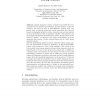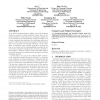68 search results - page 11 / 14 » Ring signatures without random oracles |
157
click to vote
EUROCRYPT
2003
Springer
15 years 7 months ago
2003
Springer
Abstract. Digital Signatures emerge naturally from Public-Key Encryption based on trapdoor permutations, and the “duality” of the two primitives was noted as early as Diffie-He...
154
click to vote
EUROCRYPT
2010
Springer
15 years 2 months ago
2010
Springer
We investigate the possibility to prove security of the well-known blind signature schemes by Chaum, and by Pointcheval and Stern in the standard model, i.e., without random oracle...
129
click to vote
CCS
2004
ACM
15 years 7 months ago
2004
ACM
This paper describes the direct anonymous attestation scheme (DAA). This scheme was adopted by the Trusted Computing Group as the method for remote authentication of a hardware mo...
115
click to vote
EUROCRYPT
2004
Springer
15 years 5 months ago
2004
Springer
We introduce Ad Hoc Anonymous Identification schemes, a new multi-user cryptographic primitive that allows participants from a user population to form ad hoc groups, and then prove...
CCS
2010
ACM
15 years 8 months ago
2010
ACM
In an attribute-based signature (ABS), users sign messages with any predicate of their attributes issued from an attribute authority. Under this notion, a signature attests not to...


